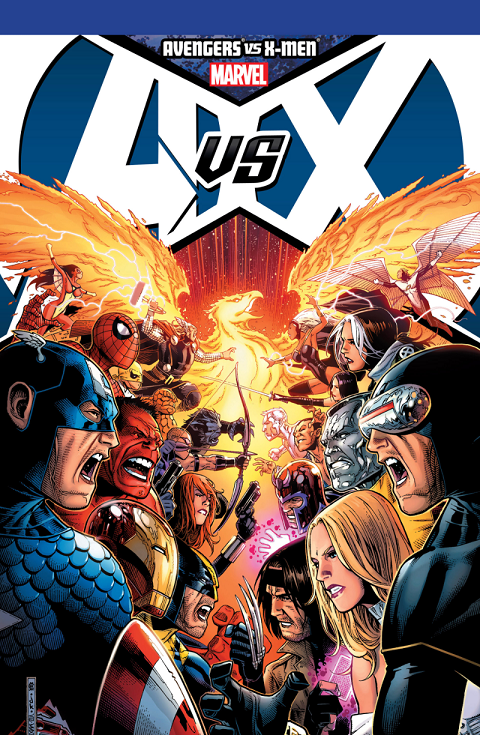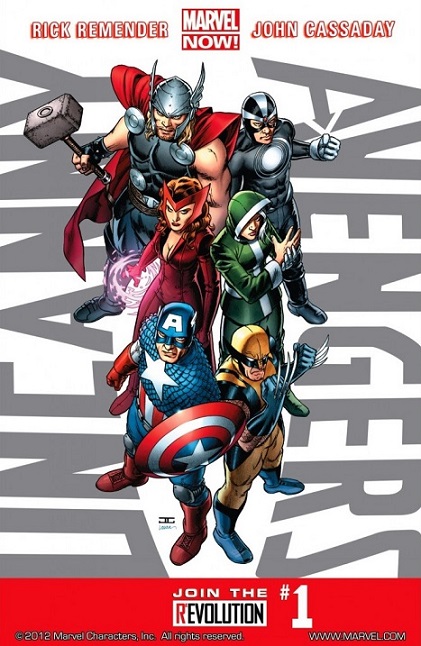The only real reason anyone should read Avengers vs X-Men is because of the fact that the 'repercussions of the storyline resulted in the new status quo of the Marvel Universe presented in the company's Marvel NOW! relaunch initiative'. It birthed a new line-up of X-titles based on the aftermath of said major event. Heck, I'm currently reading one now (Uncanny Avengers) which is shitty, by the way, and almost rivals X-Men Volume IV which I quit halfway through. I'm quitting Rick Remeder's UA sooner rather than later as well. Sorry, Rick. It seems like not everything you write can be like your new ongoing series Low (which I like, so stick with that instead). ANYWAY, back to AVX.
This mammoth collection clocked close to nine hundred pages (my soft copy has at least 798, and the one I use for updates in Goodreads has eight-hundred-something). Regardless, this volume contains the centerpiece tale divided in three winding acts (with twelve or more issues, I honestly did not count) like a play, which ran for at least four hundred pages. The rest were just tie-ins concerning the varied fights among Avengers and X-Men which basically played out like cheesy pro-wrestling matches--even the writers themselves admit there was no plot--just a bunch of decent, noble superheroes tearing each other new assholes. I did not bother reading that part of this collection because FUCK...THAT.
If I want to watch pro-wrestling, I'll watch pro-wrestling and not read it, for chrissake. That sort of choreographed fighting matches are best experienced in the live-action medium, thanks very much. With that said, my review will focus on the centerpiece narrative minus tie-ins, and so my rating will solely be based from that.
Written by Brian Michael Bendis, Matt Fraction, Jason Aaron, Ed Brubaker , and illustrated by Jonathan Hickman, John Romita, Jr., and Olivier Coipel
Adam Kubert, the colossal clusterfuck extravaganza deemed Avengers vs. X-Men had three major conflicts at its very core. With the exception of the stupid tie-ins, it's actually riveting examination of character arcs concerning a pair of men and women respectively--Captain America and Cyclops; Scarlet Witch and Hope Summers.
As for the central conflicts themselves, I enumerated and summarized them as the following below:
- The Coming of the Phoenix Force and its ramifications
- Hope's failure to be its receptacle and her journey to reclaim it
- Cyclops and Captain America's clash of leadership and objectives
The rest are either interrelated or consequential of these big three, in my opinion. As a concept, it's pretty interesting and definitely an enjoyable thing to watch unfold. The Avengers--world's heralded group of the mightiest heroes--and the X-Men--world's persecuted group of the most outcast misfits--finally reach a grand breaking point. For a time, these separate superhero factions have managed to live and serve in mutual co-existence, albeit the underlying tension and personal politics that define their working relationships. But since mutant and Avenger member Wanda Maximoff (Scarlet Witch) decimated mutant population, the X-Men became more marginalized than ever, just when you thought it was not possible. A chain of events followed where readers get to see Scott Summers, formerly known as the Golden Boy and favored son of Charles Xavier, be pushed to his limits until he was committing small atrocities in the name of the survival of mutantkind.
Raised in the beliefs of a mentor who preached pacifist ways as oppose to violence, Cyclops unfortunately started leaning more on Magneto's philosophy until he was marching into a crusade that spits in the face of the values he was supposed to uphold as an X-Man. It was a gritty character development that no one saw coming until it was already walking that tight rope. With his desperation to save mutantkind, Scott Summers nearly destroys everything that wasn't a part of his beloved race.
Some would say his war against the Avengers was an overreaction; others would say it was perfectly justified. Captain America--in spite of it being unintentional--had neglected to take account mutantkind in his American dream of truth, equality and justice. He had cast them out as a separate race who seem secondary to the humans. In Scott's eyes, it was an unforgivable act of both ignorance and arrogance. The Avengers have played as unaware enablers, shielding humanity from the worst of mutantkind instead of helping the X-Men educate humans to the best of their race. They worked together as teams multiple times, but it was out of tolerance than real camaraderie and friendship. And Scott finally has had enough of Captain America's self-righteousness and condescension. It was time for extreme measures.
Can we really blame Scott for the steps he took to secure liberty and guarantee mutantkind's survival? After all, this was the same boy who was chosen and tasked by Professor X himself to lead his kind, one who is crippled by survivor's guilt at a tender age and who always felt the need to restrain his powers as oppose to fully embracing them. This boy grew up to be a man who lost his first love to an absolute power beyond anyone's comprehension; a man who had to hold together a fractured race of confused, terrified and powerful misfits whom human society continued to hunt down and kill; a man whom several circumstances with stakes against his favor kept pushing to a corner to until he finally pushed back. Avengers vs X-Men tells the story of Scott Summer's fall from grace, that horrific moment in his life when he was determined to accept the coming of the Phoenix Force to Earth, and the role that mutant messiah Hope had to play in all this, as the miracle he had been wishing for since the decimation. This was a man who had everything he believed in tested, broken down and twisted into something even he himself could no longer recognize. And so he was ready to bet it all and let the rebirth power of the Phoenix take course.
The twist, however, came when the Phoenix refused Hope. The mutant messiah who was born and trained for greatness has flinched at the last second when she was supposed to receive the Phoenix, and in return the Phoenix claimed Scott Summers, Emma Frost, Namor, Colossus and Illyana Rasputin. The Phoenix Five began fixing the world's problems using their powers but they are ticking bombs that could explode any moment and so the Avengers have to put a stop to all this madness.
One by one, the Phoenix Five are defeated until only Scott and Emma were left. As it turns out, the more their numbers decrease, the residual power of the Phoenix gets absorbed by the ones left, making the two lovers the most powerful beings in the universe. The only two people who can dissuade them are Hope and Wanda; the former was the rightful receptor of the Phoenix while the latter is the mutant who destroyed her own kind. It would seem even the Phoenix recognizes Wanda's powers as a destroyer, which was why Scott and Emma were wary of her.

Meanwhile, Scott continues to justify his actions to his mentor and surrogate father:
And even to himself, and the ghost of his beloved late Jean:
The climactic moment took place when Charles Xavier tried one last time to get through Scott who had taken Emma out of the equation and absorbed the Phoenix for himself--turning him into the Dark Phoenix second incarnate. All is fucked when Scott killed the man in a symbolic gesture that was just as intimate and devastating:
After the commotion settles, Hope stepped in and claimed the Phoenix as her own. As soon as she was possessed by it, she began repairing all the global damage the Phoenix Five previously inflicted due to their fights with the Avengers. Hours ago, she and Captain America had a heartfelt conversation where she asked him to trust her because she vowed she will do things differently. He did, but now that she had the Phoenix burning inside her, filling her with the glow of creation, Hope refused to let it go. She was meant to be the mutant messiah after all. She had to become the Phoenix for good and never relinquish its hold.
But then Wanda the Scarlet Witch convinced her otherwise; this was a woman who had the power to bend and re-create realities at will, and she had used it to fracture mutantkind just to punish her father Magneto. She will now have to forever live with that atrocity for the rest of her life. She cautioned the young Hope to not commit the same mistake, assuring her that if Hope was strong enough to let that kind of monstrous power in, then she is strong enough to let it go.
Across the world, thousands of mutants were being born again. It was the final gift of the Phoenix Force as Wanda and Hope relinquish it back to the cosmos where it belonged. Lives and relationships were never the same again. Captain America knew he had to establish a real working relationship between Avengers and the X-Men; Scott Summers was imprisoned and labeled a terrorist but was fine with it because his wish was granted; Wolverine and the rest of the X-Men bury Xavier together and mourn his passing, as he decided to open a new mutant school named after Jean Grey; and a new line-up of X-titles were born.
This was a story meant to be read for posterity. It was unevenly paced, often alternating between being rushed or dragging, but had enough moments of great character conflicts to still be a riveting read for an X-Men fan who enjoys exploring the complicated interplay among its heroes and villains. Taking out the tie-ins out of consideration, Avengers vs. X-Men is an important work in itself in spite of its glaring flaws and a few plot holes here and there.
RECOMMENDED: 7/10






















